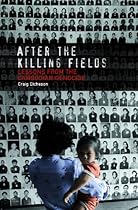Read After the Killing Fields: Lessons from the Cambodian Genocide by Craig Carlyle Etcheson Online
[Craig Carlyle Etcheson] ↠ After the Killing Fields: Lessons from the Cambodian Genocide ↠ Read Online eBook or Kindle ePUB. After the Killing Fields: Lessons from the Cambodian Genocide Detailing the struggle of coming to terms with what happened in Cambodia, Etcheson concludes that real justice is not merely elusive but may, in fact, be impossible for crimes on the scale of genocide.This book details the work of a unique partnership, Yale University's Cambodian Genocide Program, which laid the evidentiary basis for the forthcoming Khmer Rouge tribunal and also played a key role in the international advocacy necessary for the tribunal's creation. For 25 years, Cambodia's Khmer

| Title | : | After the Killing Fields: Lessons from the Cambodian Genocide |
| Author | : | |
| Rating | : | 4.13 (957 Votes) |
| Asin | : | 027598513X |
| Format Type | : | paperback |
| Number of Pages | : | 272 Pages |
| Publish Date | : | 2013-10-20 |
| Language | : | English |
Detailing the struggle of coming to terms with what happened in Cambodia, Etcheson concludes that real justice is not merely elusive but may, in fact, be impossible for crimes on the scale of genocide.This book details the work of a unique partnership, Yale University's Cambodian Genocide Program, which laid the evidentiary basis for the forthcoming Khmer Rouge tribunal and also played a key role in the international advocacy necessary for the tribunal's creation. For 25 years, Cambodia's Khmer Rouge have avoided responsibility for their crimes against humanity. Despite regular denial of knowledge of the mass killing among the surviving leadership of the Khmer Rouge, Etcheson demonstrates that they were not only aware of it, but that they personally managed and directed the killing.. New findings demonstrate that the death toll was approximately 2.2 million peopleabout half a million more than commonly believed. It presents the information collected through the Mass Grave Mapping Project of the Documentation Center of Cambodia and reveals that the pattern of killing was relatively uniform throughout the country. Arguing that this series of hostilities, which included both civil and external war, amounted to one long conflictThe Thirty Years WarCraig Etcheson demonstrates that there was one constant, churn
"A unique insider's perspective of the Khmer Rouge era" according to Arnold. This book focuses on the long struggle to bring the Khmer Rouge accountable for the auto-genocide that occurred in Cambodia in the late 1970s. Unlike most books on Cambodia, it does not focus on the history of the killings but how different actors in Cambodian society have dealt with the aftermath. It provides a very useful description of the Documentation Center for Cambodia's work collecting information on the killings. The last chapters discuss the politics behind bringing. A good examination of the complicated and sad politics Craig Etcheson started working to help Cambodia years ago. Knows what is going on. A good examination of the complicated and sad politics. Better than many of the shallow reports.
He has been a faculty member at the Johns Hopkins University, Yale University, and the University of Southern California. He works with governments, international organizations, and NGOs in the search for ways to help heal nations that are recovering from genocide and other extreme violence. Craig Etcheson is a principal founder of the Documentation Center of Cambodia. He is the author of several book-length treatises on ext
The author describes the efforts of the Documentation Center of Cambodia in amassing proof that the leaders of the Khmer Rouge ordered mass executions throughout Cambodia during the 1975-79 regime. Moreover, no one in Cambodia's political elite is completely untainted. "More than 25 years after the fall of the Khmer Rouge regime, those responsible for genocide and human rights violations in Cambodia have yet to answer for their crimes. Why has justice for the Cambodian people been so elusive? Etcheson argues that a culture of impunity persists in Cambodia, and that national reconciliation and healing will require a properly conducted war crimes tribunal, perhaps overseen by the UN. Etcheson's historical and legal concerns are intertwined, since the evidence from documents, interviews, and eyewitness accounts, backed up by physical evidenc
Download After the Killing Fields: Lessons from the Cambodian Genocide
Download as PDF : Click Here
Download as DOC : Click Here
Download as RTF : Click Here
